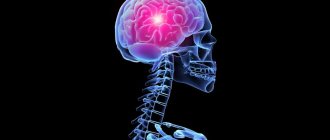Lybalvi (olanzapine + samidorphan) is a new drug intended for the treatment of adult patients with schizophrenia or bipolar I disorder. With the latter, “Libolvi” can be used equally for the relief of acute manic or mixed episodes, monotherapeutically or as an additional drug to lithium or valproate, and as part of maintenance monotherapy.
Regulatory approval for Libolvy, developed by the Irish Alkermes, was issued by the US Food and Drug Administration (FDA).
Libolvy, built around the widely used antipsychotic olanzapine, added samidorphan to curb olanzapine-induced weight gain.
Causes of mental illness
The exact cause of schizophrenia has not yet been identified. It is believed that this is a multifactorial disease that develops under the influence of a number of provoking and predisposing factors:
- Burdened heredity. If you have close relatives with schizophrenia, the risk of developing it in your offspring increases by about 20 times.
- Unfavorable social conditions such as poverty and family instability.
- Bad habits. Smoking, drug addiction, substance abuse and alcoholism do not so much cause the disease as accompany schizophrenia, complicating its course.
- Complicated pregnancy (prematurity, intrauterine hypoxia or infections).
- Emotional turmoil, especially in childhood. It has been proven that people who have experienced physical or sexual violence are more likely to develop schizophrenia.
- Anomalies in the development of central nervous system structures. Autopsies of dead patients showed that most of them had dilation of the cerebral ventricles, a decrease in the volume of the frontal lobe, and organic changes in the temporal gyri and hippocampus.
There are other theories of the development of schizophrenia that are not so popular and widespread.
Forecast
Unfortunately, it is not yet possible to completely cure schizophrenia. Its chronic course requires treatment on an outpatient basis or at home, but acute attacks require hospitalization to relieve them. Rehabilitation can be carried out in a so-called day hospital, that is, the patient receives procedures in the hospital during the day and spends the night at home.
As for the prognosis, it generally depends on the response to treatment. If the tactics, methods of psychotherapy and medications are chosen correctly, then it is possible, albeit with difficulty, to achieve good results in which the patient will be able to live normally, have a family, work, etc. But he will have to take certain medications throughout his life and regularly visit a psychiatrist.
You can give examples from practice.
There have been cases where, thanks to successful treatment, a person who had one or two attacks at the beginning of the disease lived the rest of his life without relapses.
There are also people diagnosed with schizophrenia who live ordinary lives, performing quite complex tasks and engaging in mental activity.
Timely modern treatment allows the patient to return to his usual activities, since his intellect is not affected.
Long-term remission is possible in the following categories of patients:
- women;
- having a high level of socialization;
- sick people in old age;
- having a high level of intelligence;
- if the cause of the disease is severe psychological stress;
- having strong psychological support from others.
Many people have been restored to a state in which they can take care of themselves and perform simple operations.
Despite such positive data, it should be understood that a relapse can occur at any time, and both the patient and his relatives need to be prepared for this. It also happens that after an acute attack a person becomes disabled, unable to be independent, with a severe mental condition and requiring constant care.
Stages
The disease goes through several stages in its development, each of which is characterized by certain typical manifestations.
- Primordial. During this period, a person’s personal qualities and behavior change. The patient becomes distrustful and overly suspicious.
- Prodromal. The patient withdraws into himself, limits himself as much as possible from others, and stops communicating even with the closest people. At this stage, a person often loses his job due to his absent-mindedness, irresponsibility and lack of concentration.
- First mental episode. During this period, the patient is susceptible to obsessions and delusions, and may see hallucinations.
- Remission. This time period can vary in length from a couple of weeks to several years.
After the completion of the first cycle, a periodic change of the 3rd and 4th stages begins. Gradually, the duration of remissions decreases, and exacerbations become longer and more severe.
Drug therapy
As already mentioned, the use of special drugs is the main method of treating schizophrenia. They are prescribed by a doctor and they are usually from the line of antipsychotics (neuroleptics). Usually this is one or, very rarely, two drugs, but three - under no circumstances.
The advent of antipsychotics in the mid-twentieth century literally revolutionized the treatment of schizophrenia. Before this, weaker and less effective bromides, plant extracts, opiates, antihistamines, and also a very radical lobotomy were used.
Antipsychotics block dopamine receptors, which cause the main symptoms of schizophrenia – hallucinations and delusions. In addition, they also have the following effects:
- hypnotic;
- sedative;
- antiemetic;
- anti-anxiety;
- relieve cognitive impairment and negative disorders.
Treatment with antipsychotics is a long process, since they have an effect in no less than a month, or even six. And such a long period is not reduced, even if the elimination of the attack was successful.
Taking such medications does not stop during the period of stabilization and prevention.
If a patient has 1 attack, supportive pharmacological treatment continues for two years, 2 attacks - five years, and 3 or more - throughout life.
The dosage can be reduced by a specialist at the preventive stage, but you cannot stop taking the medication without his recommendation - this can cause a relapse.
List of tablets and other forms of medication:
- Chlorpromazine (Aminazine) is the “elder” among antipsychotics. Relieves manic and psychomotor agitation, paranoid state, hallucinations. Has a strong sedative effect. Available in the form of 0.25 and 0.5 g tablets, injection solution. Contraindicated for elderly people.
- Haloperidol is an equally well-known drug, a selective blocker of dopamine receptors. The maximum permissible dose per day is 100 mg, the dosage is determined by the doctor. Available in 1.5 mg tablets, solution, drops.
- Risperidone is a benzisoxazole derivative, the optimal dose is 0.5–6 mg. Affects serotonin and dopamine receptors. Suitable for relief of attacks and prevention.
- Clozapine is a very powerful drug that also has sedative, antidepressant and anxiolytic effects. It is used only if the patient is immune to other antipsychotics, but not to relieve attacks, as it can lead to a decrease in the body's resistance to infections.
- Quetiapine or Seroquel. Its effects are similar to Haloperidol, but it has fewer side effects. Daily dose 150–170 mg.
- Amilsupride (Solian) – acts selectively on dopamine receptors, bypassing alpha-adrenaline, histamine and serotonin receptors. It also has a calming effect. Relieves symptoms of schizophrenia.
- Thioridazine (Sonapax) is a classic antipsychotic, very mild compared to others, has few side effects, calms, relieves depression, suicidal thoughts, etc. Suitable for children from two years old.
This is not the entire list of pharmacological agents for the treatment of schizophrenia.
The doctor selects the drug based on the patient’s health status, age, symptoms, and drug compatibility. Thus, for a certain category of patients, he considers the traditional strong haloperidol more suitable, and for others, the gentle risperidone.
If antipsychotics do not have the necessary effect (and this happens), then other drugs are prescribed, which, unfortunately, are more toxic. If this does not have any effect, then insulin coma, cytokines, and electroconvulsive therapy are used.
Side effects of antipsychotics
Drugs of this group, for all their excellent therapeutic qualities, unfortunately, have many negative side effects. That is, they are unsafe, and such manifestations depend on:
- type of antipsychotic (typical, atypical);
- doses;
- patient's age;
- the patient's condition;
- duration of therapy;
- compatibility with other drugs.
The biggest possibility is parkinsonism, that is, trembling and muscle spasms. Especially often, such a reaction can be caused by first-generation antipsychotics; this is less common for the second.
Other side effects include:
- drowsiness;
- disorders of the gastrointestinal tract;
- anxiety;
- depression;
- increased muscle tone;
- weight gain, change in appetite;
- fear.
Also possible:
- allergy;
- cholestatic jaundice;
- pneumonia;
- epileptic seizures;
- enlargement of the mammary glands;
- decrease in hemoglobin level.
Long-term treatment with antipsychotics risks menstrual irregularities for women, sexual dysfunction for men, and both:
- infertility;
- development of diabetes;
- stroke, ischemia, heart attack;
- osteoporosis;
- constipation;
- dizziness;
- blurred vision, etc.
Taking such drugs for more than 5 years reduces brain weight.
Too high doses of neuroleptics lead to a very dangerous neuroleptic syndrome, manifested by fever, muscle rigidity, and leukocytosis. The result can be terrible - death.
There are no antipsychotics that do not have side effects, even if they are the latest generation. But more effective medications have not yet been invented. Therefore, it is very important that the treatment is carried out by experienced psychiatrists who are able to select the correct medications and their correct dosage. And the patient should strictly follow the specialist’s instructions.
Ancillary drugs
Levodopa will help reduce the parkinsonian effect produced by antipsychotics.
To reduce anxiety and eliminate depression that accompany schizophrenia, tranquilizers - antidepressants are used:
- Phenazepam;
- Diazepam;
- Chlordiazepoxide;
- Sertraline;
- Fluoxetine.
To improve cerebral circulation, nootropics are prescribed: Pantogam and Piracetam.
Lithium salts and carbamazepine help stabilize the emotional state.
No folk remedies can help in the treatment of schizophrenia, but in some cases the doctor may allow tincture of lemon balm, motherwort, and valerian as a sedative.
Signs of schizophrenia
The development of vivid and characteristic clinical manifestations of schizophrenia is preceded by a premorbid period, which can last several years. During this time interval, loved ones note that the person is behaving somehow differently, has become more aggressive, withdrawn and distrustful.
The height of the disease is characterized by the development of two types of symptoms.
Positive symptoms
- Hallucinations. They can be auditory, when the patient hears voices that control his behavior, threaten him, order him to perform this or that action. Visual hallucinations are also possible, but are extremely rare.
- Rave. This symptom is characterized by the patient’s belief that evil spirits or alien beings are influencing him using magic, hypnosis, or any technical devices that do not exist in reality. Delusions of jealousy (confidence of betrayal), persecution (the patient thinks that he is being watched), self-flagellation (the patient is to blame for all earthly troubles), grandeur (a person may introduce himself as the ruler of the world), dysmorphophobia (confidence in his own external ugliness) may also occur.
- Obsessions and movements.
- Reasoning and lengthy reasoning. Patients are unable to concentrate on one topic, constantly jump from one to another, and often lose the thread of the story.
Negative symptoms
- Emotional disorders and social isolation. Schizophrenics immerse themselves in themselves and completely isolate themselves from others.
- Drift is the inability to make one's own decisions. Patients copy the behavior of others.
- Hypobulia. Patients' needs are reduced, they don't care what they eat, they refuse to take a shower, and their libido disappears.
"Libolvi": mechanism of action
Oral Lybalvi (ALKS 3831) is a combination of the atypical antipsychotic olanzapine and the opioid antagonist samidorphan.
The mechanism of action of olanzapine is not precisely established. Its antipsychotic properties are believed to be mediated by antagonism of dopamine and serotonin receptors. Olanzapine, compared with other common atypical antipsychotics, has a low risk of extrapyramidal side effects, including tardive dyskinesia, due to its increased affinity for the serotonin 5-HT2A receptor relative to the dopamine D2 receptor.
A common adverse effect of all atypical antipsychotics, and especially olanzapine, is metabolic disturbances, manifested by significant weight gain with a concomitant increase in the risk of developing hyperglycemia and type 2 diabetes mellitus. Weight gain is thought to be due to histamine H1 receptor antagonism causing sedation and 5-HT2C and D2 antagonism leading to appetite stimulation. In addition, olanzapine exhibits potent antagonism of the muscarinic M3 receptor, which may explain its diabetogenic effect.
Samidorphan works primarily as an antagonist at the μ-opioid receptor, while also exhibiting partial agonism at the κ- and δ-opioid receptors. [] [] [] Opioid receptor antagonism has been shown to mitigate drug-induced weight gain and/or metabolic disorders in in vivo mouse studies. [] [] []
Good news
A new antipsychotic for the maintenance treatment of schizophrenia from the Janssen company, part of the Johnson & Johnson pharmaceutical division, Trevicta, has been registered in Russia. It has a long-lasting effect and can be used only 4 times a year, that is, every three months, which is much better than monthly injections of long-standing antipsychotics.
Trevicta is now an antipsychotic with the longest dosing interval registered in our country. It maintains its optimal concentration of paliperidone in the patient’s blood for a long time, which is why it requires such rare use.
Prescribe three months of Trevicta to patients with a stable condition after treatment with other drugs. It helps reduce the risk of relapse due to its prolonged action, has a low risk of side effects, and does not create withdrawal syndrome if treatment is abruptly stopped. This makes it possible for a patient with schizophrenia to socialize and maintain his constant normal state.
What is schizophrenia: features of the disease
Schizophrenia is a serious mental illness. Contrary to popular belief, it has nothing to do with split personality. The misconception was entrenched due to the fact that from ancient Greek - Schizophrenia is literally translated as splitting (schizo) of the mind (phrēn).
The nature of schizophrenia is a violation of selectivity (selectivity) of perception.
What is this?
We are always affected by many stimuli: noise outside the window, a fly flying past, light, the feeling of the floor under our feet, and so on, every second our senses perceive hundreds of stimuli, but our brain is designed in such a way that we choose from all of them only those that we need at the moment and we concentrate on them. For example, the author writing this article concentrates on the keyboard and the words appearing on the computer monitor; other stimuli, the same sound of cars outside the window, is not distracting and is not a priority - it passes by consciousness, although it is realized.
In schizophrenia, this brain function is disrupted and everything comes into the field of vision of consciousness. So we cannot simultaneously pay equal attention to differently directed stimuli, and confusion arises. But the patient’s brain still tries to build some kind of system from this mess in the head and give a logical explanation to everything that is happening, and this makes the behavior of a person with schizophrenia non-adaptive, and his perception of reality, from the point of view of a healthy person, abnormal.
Outpatient treatment of schizophrenia in a psychiatric clinic
When the psychosis is removed, the condition stabilizes, and the patient becomes aware of his illness, it becomes possible to switch to outpatient treatment. At this stage, the patient continues to take medications and undergo psychotherapy. Treatment with biophysical methods is also continued if necessary. In the process of outpatient treatment of schizophrenia, the main goal is the prevention of new exacerbations. This is an important stage, since more than 80% of patients stop taking medications after hospitalization, which leads to new psychosis. In turn, among those who continue treatment, studies show that about a third of people recover completely, and a third show improvement. With repeated exacerbations, the prognosis worsens and the chances of achieving remission or a favorable course of the disease are reduced, so preventing new exacerbations is an important task.
At the outpatient stage, treatment for schizophrenia is supportive. For a psychiatrist, the primary task is to motivate the patient to continue treatment, which is facilitated by psychoeducation . This is a way of conveying information about the disease and its treatment to the patient and his family members. The psychiatrist explains to the patient what can cause an exacerbation and what it leads to. It is important for the patient to know what signs to use to determine the deterioration of his condition and how to avoid situations that provoke the onset of an exacerbation.
During the outpatient period of treatment for schizophrenia, the patient visits a psychiatrist to monitor his condition. If the patient has complaints, the doctor can adjust the treatment in time: he controls the concentration of the drug, which depends on a large number of factors, for example, taking other drugs or smoking. In some cases, the drug may accumulate in the body, leading to intoxication. Learn more about measuring drug concentrations
If the patient does not want or is simply unable to systematically take medications, he is prescribed depot medications . These are long-acting drugs that allow you to maintain the required level of drug concentration in the patient’s body. However, such drugs also have certain disadvantages - side effects, although less frequent, are much more pronounced and more difficult to correct. In addition, setting the appropriate dose and frequency of administration of the drug is a very complex process that requires long-term observation.
Along with drug therapy, non-drug methods occupy a significant place in outpatient treatment, the main of which is psychotherapy. It helps to understand the fallacy of delusional ideas and correct cognitive impairment (deterioration of memory, attention, thinking).
Psychotherapy has many varieties: family, individual and group, behavioral, communicative-corrective, cognitive. Psychotherapy for delirium – metacognitive training – plays an important role. Our clinic uses training developed by prof. Moritz, Germany. More about metacognitive training
Pharmacotherapy of cognitive impairment
When treating schizophrenia, it is important to pay attention to the state of the cognitive sphere of patients. However, unfortunately, at present there are no medications that can effectively eliminate the manifestations of cognitive deficit.
Unlike traditional antipsychotics, which weaken motivation, some atypical antipsychotics have a positive, although small, effect on memory. At the same time, some atypical antipsychotics open up the possibility of improving memory with the help of special cognitive training , in particular, performing tasks that require accelerating memory.
As noted above, dysfunction of executive functions is registered already in the initial phase of schizophrenia and persists throughout its course. J. Arnt, M. Dendriksen (2006) in their review on the effect of antipsychotics on the cognitive sphere of patients with schizophrenia, came to the conclusion that drugs that intensively bind D2 receptors negatively affect the cognitive abilities of patients with schizophrenia. At the same time, J. Lee et al. (2007) found that in patients naive to any antipsychotics, after 8 weeks of treatment with haloperidol or risperidone, there was no change in executive function ability as measured by the Wisconsin Card Sorting Test (WCST). Both drugs, on the contrary, even improved the performance of the labyrinth test. According to K. Gauggel (2008), in terms of assessing the effect of antipsychotic drugs on the cognitive sphere of patients with schizophrenia, the so-called MATRICS initiative, which was created in 2003 on the basis of a standardized battery of tests, is represented.
The literature devoted to correctors of extrapyramidal disorders that have developed as a result of taking antipsychotics emphasizes that anticholinergic drugs significantly worsen the state of the cognitive sphere of patients with schizophrenia . Due to the above, unreasonable use of these drugs is not recommended, especially for a long period. Taking into account the peculiarities of the interaction between the dopaminergic and cholinergic systems of mediators, it can be assumed that traditional antipsychotics that block D2 receptors and correctors of extrapyramidal symptoms, which have anticholinergic activity, potentiate the negative effect on the cognitive abilities of patients with schizophrenia. Clinical observations indicate that anticholinergic drugs can provoke a relapse of this mental disorder, in particular by causing an exacerbation of productive symptoms. On the other hand, patients often use these medications as psychostimulants to combat apathy and decreased energy potential.
A number of foreign studies have shown that drugs with anticholinergic activity can cause isolated impairments of declarative memory in patients with schizophrenia. At the same time, despite the fact that clozapine, unlike risperidone, exhibits a clear anticholinergic effect, it does not differ from the latter in the degree of influence on the memory of patients with schizophrenia. This can be partly explained by the fact that the main metabolite of clozapine, desmethylclozapine, exhibits antagonism towards M1 muscarinic receptors.
If we rank modern antipsychotics according to the degree of their anticholinergic effect, then clozapine and olanzapine will be in the first positions, and aripiprazole, risperidone and ziprasidone - in the last, with quetiapine likely to occupy an intermediate position. As a result of the above, it can be assumed that clozapine and olanzapine will have a more negative effect on the cognitive sphere of patients with schizophrenia than aripiprazole and ziprasidone.
Currently, various pharmaceutical companies are attempting to synthesize drugs that have a positive effect on the cognitive sphere of patients with schizophrenia. Despite encouraging results, most of these medications are not officially approved. Thus, in particular, in terms of improving cognitive abilities, the new drug tolcapone, which affects the activity of catechol-o-methyltransferase, is of interest. Buspirone and tandospirone, considered partial agonists of 5HT1A receptors, used in combination with antipsychotics, improve the cognitive state of patients with schizophrenia. Glutamate agonists such as glycine and D-serine, as well as the partial agonist D-cycloserine, show positive effects on cognitive function, but do not show this in combination with clozapine. The glycine transporter and inhibitor sarcosine also improves cognitive function, but in combination with clozapine this effect is noticeably weakened. Xanomeline, an agonist of M1 and M2 receptors, is effective in Alzheimer's disease, but in schizophrenia, the ability of this drug to improve the cognitive state of patients is questioned.











